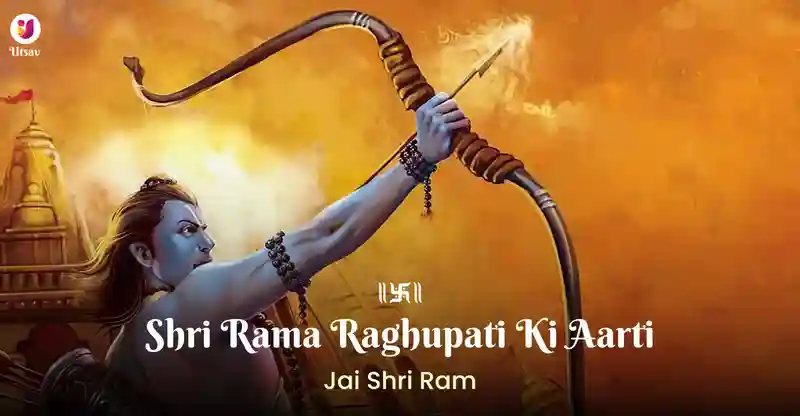Shri Rama Raghupati Ki Aarti - Benefits, special occasion and when to recite
Mon - Apr 29, 2024
2 min read
Share
"Bhajaun Raghupati Karuna Nidhana" reverently acknowledges Lord Rama as the compassionate refuge of humanity. It reflects profound devotion, recognizing Rama's boundless mercy and kindness, portraying him as the source of solace and compassion for all beings.

Aarti
Bandaun Raghupati Karuna Nidhana।
Jate Chhutai Bhava Bheda Gyana॥
Raghubansa Kumuda Sukhaprada Nisesa।
Sevata Pada Pankaja Aja Mahesa॥
Nija Bhakta Hridaya Pathoja Bhringa।
Lavanyabapusha Aganita Ananga॥
Ati Prabala Moha Tama Maratanda।
Agyana Gahana Pavaka Prachanda॥
Abhimana Sindhu Kumbhaja Udara।
Suranjana, Bhanjana Bhumibhara॥
Ragadi Sarpagana Pannagari।
Kandarpa Naga Mrigapati, Murari॥
Bhava Jaladhi Pota Charanarabinda।
Janaki Ravana Ananda Kanda॥
Hanumanta Prema Bapi Marala।
Nishkama Kamadhuka Go Dayala॥
Trailoka Tilaka, Gunagahana Rama।
Kaha Tulasidasa Bishrama Dhama॥
Benefits
1. Cultivates deep devotion towards Lord Rama.
2. Invokes Rama's boundless compassion and mercy.
3. Provides solace and comfort to the devotee.
4. Strengthens faith and belief in divine grace.
5. Promotes inner peace and tranquility.
6. Inspires acts of kindness and compassion towards others.
7. Serves as a source of spiritual upliftment and guidance.
8. Fosters a sense of connection to the divine.
Special occasion and when to sing:
1. Daily Worship: Included in morning or evening prayers, as part of daily worship rituals.
2. Ram Navami: Celebrated during Lord Rama's birthday festivities, it's sung with great devotion and fervor.
3. Rama Janmabhoomi Pujan: During ceremonies related to Rama's birthplace, such as groundbreaking ceremonies or temple constructions.
4. Ramayana Recitations: After discussions or recitals of the epic Ramayana, as a way to conclude and honor Lord Rama.
5. Festivals: Sung during festivals dedicated to Lord Rama, such as Diwali or other Rama-related celebrations.
6. Personal Prayer: Chosen for individual moments of prayer and meditation, as a means to seek blessings and express devotion to Lord Raghuvar.
Share